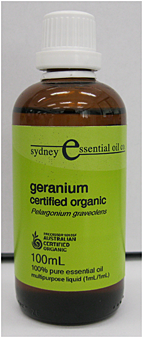Class action more pressure against DMAA
Class action more pressure against DMAA
 The regulatory status and safety of DMAA, a stimulant used in sports and weight loss supplements and reported by some to be a natural constituent of geranium oil, has been challenged again.
The regulatory status and safety of DMAA, a stimulant used in sports and weight loss supplements and reported by some to be a natural constituent of geranium oil, has been challenged again.
There is an ongoing debate about whether DMAA (1,3-Dimethyl-amylamine - also known as methyl-hexaneamine or MHA), which was first manufactured synthetically by drug giant Eli Lily in the 1940s, is in fact a constituent of geranium, with the consensus growing that it is not. Health Canada recently issued a statement arguing that DMAA is not found naturally in geranium (as many supplement makers using it claim) and affirming that any products containing it require a drug authorization.
But the US Food and Drug Administration (FDA) is yet to act on the matter, whilst trade groups are conducting research of their own.
1,3 Dimethylamylamine,' 'Methylhexanamine,' and 'Geranainine' (hereinafter referred to as 'DMAA')
LOS ANGELES (CN) - A class action claims Florida-based BPI Sports' bodybuilding and dietary supplements "contain a dangerous amphetamine-like ingredient that poses a serious health risk and has potentially life-threatening side effects."
Named plaintiffs Clint Eskenski and Camden Brady describe lead defendant BPI Sports as "an incredibly successful company which manufactures, distributes, markets, and sells a variety of purported dietary supplements to consumers. BPI's best selling products include '1.M.R' powder and tablets, 'RoxyLean ECA' and 'Rx6' (collectively, the 'products.') These products are purported dietary supplements which are marketed for use as bodybuilding and weight loss supplements. 1.M.R is marketed as a pre-workout bodybuilding supplement. RoxyLean and Rx6 are marketed as 'fat burning' weight loss supplements.
"However, the products contain a dangerous amphetamine-like ingredient that poses a serious health risk and has potentially life-threatening side effects. The ingredient, which is supposedly derived from the oil of the geranium plant, is known by many names, including '1,3 Dimethylamylamine,' 'Methylhexanamine,' and 'Geranainine' (hereinafter referred to as 'DMAA').
"At the time plaintiffs Clint Eskenazi and Camden Brady ... purchased and used the products, they were unaware the products contained a dangerous stimulant, DMAA, the use of which is banned by several athletic organizations, and sale of which is completely prohibited in certain countries.
"DMAA was patented by Eli Lilly & Company in 1944 and later marketed, beginning in 1971, under the trademark 'Forthane' for use as a nasal decongestant and as a treatment for hypertrophied or hyperplasic oral tissues. DMAA is a vasoconstrictor and central nervous system stimulant which is on the World Anti-Doping Agency ('WADA') and Major League Baseball ('MLB') lists of banned substances. The sale of DMAA is totally prohibited in Canada and New Zealand. Recently, DMAA has gained popularity with young people as a designer drug used in 'party pills.'
"BPI failed to inform consumers that DMAA is a dangerous central nervous system stimulant which is banned by WADA, MLB, Canada and New Zealand, and that using the products can cause consumers to test positive for an illegal substance and/or amphetamine use.
 "In addition, though DMAA is claimed to be an extract of geranium oil, most of the DMAA contained in products currently on the market it wholly 'synthetic' DMAA, completely manufactured in laboratories, and is not derived from the geranium plant in any way whatsoever. In fact, plaintiffs are informed and believe and on that basis allege that the DMAA in BPI's products is purely synthetic. Significantly, recent studies have also concluded that there is no DMAA whatsoever in geranium oil, that DMAA is not extracted from geranium oil, and that all DMAA on the market is synthetic. Because DMAA is a wholly synthetic substance, it is not a 'dietary ingredient,' and BPI's products are not 'dietary supplements' as those concepts are defined by applicable regulations promulgated by the U.S. Food & Drug Administration."
"In addition, though DMAA is claimed to be an extract of geranium oil, most of the DMAA contained in products currently on the market it wholly 'synthetic' DMAA, completely manufactured in laboratories, and is not derived from the geranium plant in any way whatsoever. In fact, plaintiffs are informed and believe and on that basis allege that the DMAA in BPI's products is purely synthetic. Significantly, recent studies have also concluded that there is no DMAA whatsoever in geranium oil, that DMAA is not extracted from geranium oil, and that all DMAA on the market is synthetic. Because DMAA is a wholly synthetic substance, it is not a 'dietary ingredient,' and BPI's products are not 'dietary supplements' as those concepts are defined by applicable regulations promulgated by the U.S. Food & Drug Administration."
The plaintiffs say that DMAA has "extremely dangerous side effects." Citing a Washington Post news report, the class claims that Don Caitlin, a "pre-eminent anti-doping scientist," told the Post that DMAA is chemically similar to amphetamine and ephedrine, and can fatally raise the heart rate and blood pressure.
"The safety concerns associated with DMAA have been well documented, including concerns that DMAA is a dangerous and addictive substance that can cause headache, nausea and stroke. ... To make things worse, DMAA is widely used as a 'designer drug' in dangerous 'party pills,'" the complaint states.
The class claims: "BPI goes a step further in its marketing scheme by making false, misleading, and unsubstantiated claims regarding the safety and effectiveness of the products - claims that BPI knows are completely without merit or scientific substantiation - in order to lure unsuspecting consumers into buying the products," the lawsuit claims.
The plaintiffs seek restitution and class damages for consumer law violations, unfair competition, false and misleading advertising, breach of express warranty and breach of implied warranty.
They are represented in Superior Court by Gregory Scarlett.
Here are the defendants: BPI Sports LLC, BPI Sports Holdings Inc., Brian Pharma II LLC, and BPI principals Derek Ettinger and James Grage.
Neither the law firm nor BPI Sports responded to emailed requests for information
FDA NEWS RELEASE
For Immediate Release: April 27, 2012
Media Inquiries: Siobhan DeLancey, 301-796-4668 or 202-510-4177, siobhan.delancey@fda.hhs.gov; Tamara Ward, 301-796-7567, tamara.ward@fda.hhs.gov
Trade Press Inquiries: Sebastian Cianci, 240-402-2291, sebastian.cianci@fda.hhs.gov
Consumer Inquiries: 888-INFO-FDA
FDA challenges marketing of DMAA products for lack of safety evidence
Agency cites ten companies in warning letters
The U.S. Food and Drug Administration today issued warning letters to ten manufacturers and distributors of dietary supplements containing dimethylamylamine, more popularly known as DMAA, for marketing products for which evidence of the safety of the product had not been submitted to FDA.
Also referred to as 1,3-dimethylamylamine, methylhexanamine, or geranium extract, the ingredient is in dietary supplements and is often touted as a "natural" stimulant.
The companies receiving warning letters and their product names are:
Company Product(s)
Exclusive Supplements Biorhythm SSIN Juice
Fahrenheit Nutrition Lean Efx
Gaspari Nutrition Spirodex
iSatori Global Technologies, LLC PWR
Muscle Warfare, Inc. Napalm
MuscleMeds Performance Technologies Code Red
Nutrex Research Hemo Rage Black
Lipo-6 Black Ultra Concentrate
Lipo-6 Black
Lipo-6 Black Hers Ultra Concentrate
Lipo-6 Black Hers
SEI Pharmaceuticals MethylHex 4,2
SNI LLC Nitric Blast
USP Labs, LLC Oxy Elite Pro
Jack3D
"Before marketing products containing DMAA, manufacturers and distributors have a responsibility under the law to provide evidence of the safety of their products. They haven’t done that and that makes the products adulterated," said Daniel Fabricant, Ph.D., Director of FDA’s Dietary Supplement Program.
Specifically, the warning letters cite the companies for marketing products for which a notification had not been submitted for the use of DMAA as a New Dietary Ingredient (NDI). Under current law, dietary supplement manufacturers or distributors who use certain dietary ingredients not marketed in a dietary supplement prior to October 15, 1994, are responsible for notifying the FDA of evidence to support their conclusion that their dietary supplements containing NDIs are safe. Manufacturers or distributors must submit notification at least 75 days before marketing their products. The companies warned today were marketing products for which this requirement had not been met.
The FDA warning letters also advised the companies that the agency is not aware of evidence or history of use to indicate that DMAA is safe. Under the Dietary Supplement Health and Education Act of 1994 (DSHEA), manufacturers, marketers and distributors of dietary supplements are responsible for ensuring that they are marketing a safe product.
The FDA letters noted that DMAA is known to narrow the blood vessels and arteries, which can elevate blood pressure and may lead to cardiovascular events ranging from shortness of breath and tightening in the chest to heart attack. The agency has received 42 adverse event reports on products containing DMAA. While the complaints do not establish that DMAA was the cause of the incidents, some of the reports have included cardiac disorders, nervous system disorders, psychiatric disorders, and death.
The agency additionally warned the companies that synthetically-produced DMAA is not a “dietary ingredient” and, therefore, is not eligible to be used as an active ingredient in a dietary supplement. DSHEA defines a dietary ingredient as a vitamin, mineral, amino acid, herb or other botanical, a dietary substance for use by man to supplement the diet, or a concentrate, metabolite, constituent, extract, or combination of these substances.
The companies have 15 business days to respond to the FDA with the specific steps they will take to address the issues in the warning letters.
- Login to post comments


